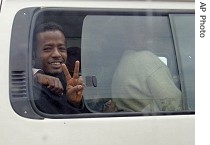2007年VOA标准英语-Ethiopia Pardons 38 Opposition Members
搜索关注在线英语听力室公众号:tingroom,领取免费英语资料大礼包。
(单词翻译)
By Nick WadhamsNairobi
20 July 2007
Ethiopia announced Thursday it had pardoned 38 opposition1 leaders and activists2 just days after its high court sentenced many of them to life in prison for their role in post-election protests in 2005. As Nick Wadhams reports from our East Africa bureau in Nairobi, the move comes after allegations that Prime Minister Meles Zenawi's government was using the convictions to crack down on his opponents.
 |
| One of the politicians released in Addis Ababa, 20 July 2007 |
Just hours after the pardons were announced, three buses were seen taking the 38 to freedom. Ethiopian Prime Minister Meles Zenawi said he hoped the pardons, issued Thursday but announced Friday, would show that his government would give people a second chance if they ask for it.
On Tuesday, a state-owned newspaper had published a letter in which the group purportedly3 asked for forgiveness after they were convicted of treason and trying to overthrow4 the constitution.
Many of those on trial had refused to defend themselves because they believed the process was a sham5. One leading opposition member, former Ethiopian President Negasso Gidada, says the cases never should have gone to court in the first place.
"Speaking from the humanitarian6 side, for the people who were in prison, that they are released I think very good, but politically we have been saying that imprisonment7 shouldn't have taken place. Because they were acting8 politically and we were demanding that they come out," he said. "This is a political condition and you cannot solve political problems with legal or administrative9 or by force. You have to solve political problems politically. The government refused."
The trial, convictions and harsh sentences had drawn10 widespread criticism from the international community. Rights groups have said it was part of a larger move by Prime Minister Meles to silence all his opponents, while the United States, Ethiopia's most important ally, had sought clemency12.
Several of those convicted were leaders of the opposition Coalition13 for Unity11 and Democracy Party, which had made major gains in the 2005 elections.
Former president Gidada says the government may have had other motives14 in releasing the prisoners.
"It's also somehow showing power, you put people in prison whenever you want and then you release them telling the people, you see I am strong and showing strength somehow trying to convey to the people that the government is magnanimous although it's not really magnanimous," he said. "This is a game which is being played."
Nearly 200 people were killed including six police in the post-election demonstrations15 in 2005, and some 30,000 people were later arrested. An independent inquiry16 into the 2005 protests had concluded that the government responded too harshly.
It's still not clear what will happen to the another 37 people who were convicted on similar charges during the trial. But the government has said it would consider clemency appeals for them.
 收听单词发音
收听单词发音 




